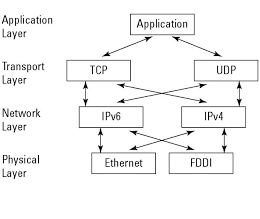 Network administrators are often posed with the challenge of choosing between IPv4 and IPv6. If you too feature in the list of confused mortals, here are the details that would help you to make an informed choice.
Network administrators are often posed with the challenge of choosing between IPv4 and IPv6. If you too feature in the list of confused mortals, here are the details that would help you to make an informed choice.
Prior to delving into the two protocols, let us first try to understand what exactly IP or Internet Protocol is. Internet protocol is the standard format for packets or addressing scheme that is followed by all the network-based communications. Majority of the networks around the world not only follow the protocol, they also combine it with TCP or Transmission Control Protocol. This is used for establishing the virtual connection between the destination and the source. Now you know why we use TCP/IP regularly.
IP is quite similar to the postal system that we follow wherein every package is delivered to a fixed address but no direct links are established between the originator and the recipient. It is the TCP/IP at work that provides a connection between the two to facilitate two way communications for a certain fixed time.
Presently, in the networking world, we have two primary IP or Internet Protocols in use –IPv4 and the new IPv6. IPv6 is the latest and quite a popular upgrade that is being used for network communication around the world. The older version or IPv4 is not going to obsolete soon and is going to co-exist with the latest version for the next few years.
Internet Protocol Version 4 or IPv4
IPv4 is used to identify the devices present on a network with the help of an addressing method. IPv4 is used in packet-switched networks by the interconnected computer communication systems. This is probably the most popular internet protocol in use and is deployed to connect a wide range of devices. This protocol uses 32-bit address scheme which facilitates the use of 2^32 (4 Billion+) addresses. As the internet users keep growing, the day is not far when we are going to run out of IPv4 addresses. Every day new devices like smartphones, game consoles, computers etc are being added to the internet and they all need IP addresses. This propelled the idea of bringing a new Internet Protocol (IPv6), which will eventually lead to the deployment of more IP addresses.
Internet Protocol Version 6 or IPv6
The other name for IPv6 is IPng (Internet Protocol next generation) and is fast replacing the older version. This protocol has been reviewed by the IETF standards committee and was recommended to replace the IPv4. Often considered to be the successor of IPv4, IPv6 is also an evolutionary upgrade. IPv6 is going to be used alongside IPv4 for the next few years till it completely replaces the same. IPv6 is here to give a new lease of life to the Internet as it would help in its unhindered growth. Thus, the hosts are going to grow in numbers along with the total volume or transmitted traffic.
Differences between IPv4 and IPv6 addresses:
IPv4 is a binary number that is stored in an easily readable format. For instance, the 32 bit numeric address in IPv4 can be written in the form of 4 numbers that are separated by the periods. The numbers can range between 0 and 255 e.g. 172.16.0.1.
On the other hand, IPv6 format addresses are stored in the form of hexadecimal numbers that are separated by colons. For instance, an IPv6 address is written as 2fef:1700:4:646:100:f6ee:ef67:21fc
Apart from an increase in the number of IP addresses and the traffic volume, there are a few other developments that IPv6 is going to bring:
- Auto configuration
- NAT obsolete
- No more collision of private addresses
- Simple format of the header
- Multicast routing will get better
- Efficient and simplified routing
- Flow labelling or True QoS (Quality of Service)
- Flexible extensions and options
- Efficient and easy administration
- Inbuilt privacy and authentication support
About One Call Communications
One Call Communications is a leading provider of phone systems in North Carolina. We serve thousands of clients across Greenville, Rocky Mt., Goldsboro, Raleigh, Smithfield, & Wilson. We sell, install, and service business telephone equipment, voicemail and, voice and data network cabling. We install and service premium quality products from Toshiba Telecom. We serve both commercial and industrial clients.
Call us today for your networking and communication requirements.



Leave a Reply